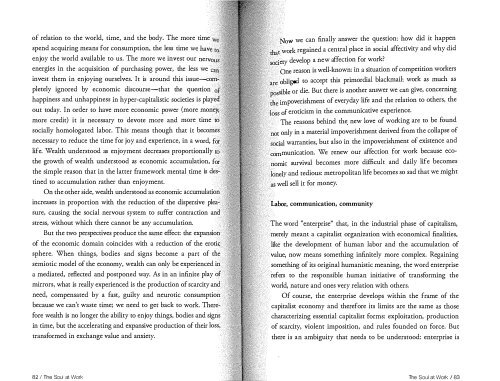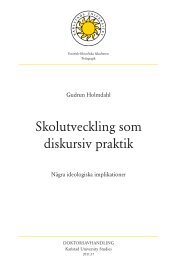Franco ''Bifo'' Berardi - The Soul at Work From Alienation to Autonomy
Franco ''Bifo'' Berardi - The Soul at Work From Alienation to Autonomy
Franco ''Bifo'' Berardi - The Soul at Work From Alienation to Autonomy
- No tags were found...
Create successful ePaper yourself
Turn your PDF publications into a flip-book with our unique Google optimized e-Paper software.
of rel<strong>at</strong>ion <strong>to</strong> the world, time, and the body. <strong>The</strong> more timespend acquiring means for consumption, the less time we haveenjoy the world available <strong>to</strong> us. <strong>The</strong> more we invest our ne.rvo,us ·'energies in the acquisition of purchasing power, the less weinvest them in enjoying ourselves. It is around this issue-com_pletely ignored by economic discourse-th<strong>at</strong> the questionhappiness and unhappiness in hyper-capitalistic societies is playedout <strong>to</strong>day. In order <strong>to</strong> have more economic power (more money,more credit) it is necessary <strong>to</strong> devote more and more time <strong>to</strong>socially homolog<strong>at</strong>ed labor. This means though th<strong>at</strong> it becomesnecessary <strong>to</strong> reduce rhe rime for joy and experience, in a word, forlife. Wealth unders<strong>to</strong>od as enjoymenr decreases proportionally <strong>to</strong>the growth of wealth unders<strong>to</strong>od as economic accumul<strong>at</strong>ion, forthe simple reason th<strong>at</strong> in rhe l<strong>at</strong>ter framework menral time is destined<strong>to</strong> accumul<strong>at</strong>ion r<strong>at</strong>her rhan enjoyment.On the other side, wealth unders<strong>to</strong>od as economic accumul<strong>at</strong>ionincreases in proportion with the reduction of the dispersive pleasure,causing the social nervous system <strong>to</strong> suffer contraction andstress, without which rhere cannot be any accumul<strong>at</strong>ion.But the two perspectives produce the same effect: the expansionof the economic domain coincides with a reduction of the eroticsphere. When things, bodies and signs become a part of thesemiotic model of rhe economy, wealth can only be experienced ina medi<strong>at</strong>ed, reflected and postponed way. As in an infinite play ofmirrors, wh<strong>at</strong> is really experienced is the production of scarcity andneed, compens<strong>at</strong>ed by a fast, guilty and neurotic consumptionbecause we can't wasre time; we need <strong>to</strong> get back <strong>to</strong> work. <strong>The</strong>reforewealth is no longer the ability <strong>to</strong> enjoy things, bodies and signsin time, but the acceler<strong>at</strong>ing and expansive production of their loss,transformed in exchange value and anxiety.NoW we can finally answer the question: how did it happenth<strong>at</strong> work regained a cenrral place in social affectivity and why didsociety develop a new affection for work?One reason is well-known: in a situ<strong>at</strong>ion of competition workersare obliged <strong>to</strong> accept this primordial blackmail: work as much aspossible or die. But there is another answer we ca give, concerningthe impoverishmenr of everyday life and the rel<strong>at</strong>Ion <strong>to</strong> others, theloss of eroticism in the communic<strong>at</strong>ive experience.<strong>The</strong> reasons behind the new love of working are <strong>to</strong> be foundnot only in a m<strong>at</strong>erial impoverishment derived from the collapse ofsocial warranties, but also in the impoverishment of existence andcommunic<strong>at</strong>ion. We renew our affection for wotk because economiesurvival becomes more difficult and daily life becomeslonely and tedious: metropolitan life becomes so sad th<strong>at</strong> we mightas well sell it for money.Labor, communic<strong>at</strong>ion, community<strong>The</strong> word "enterprise" th<strong>at</strong>, in the industrial phase of capitalism,merely meanr a capitalist organiz<strong>at</strong>ion with economical finalities,like the developmenr of human labor and the accumul<strong>at</strong>ion ofvalue, now means something infinitely more complex. Regainingsomething of its original humanistic meaning, the word enterpriserefers <strong>to</strong> the responsible human initi<strong>at</strong>ive of transforming theworld, n<strong>at</strong>ure and ones very rel<strong>at</strong>ion with others.Of course, the enterprise develops within the frame of thecapitalist economy and therefore its limits are the same as thosech<strong>at</strong>acterizing essential capitalist forms: exploit<strong>at</strong>ion, productionof scarcity, violent imposition, and rules founded on force. Butthere is an ambiguity th<strong>at</strong> needs <strong>to</strong> be unders<strong>to</strong>od: enterprise is82 ; <strong>The</strong> <strong>Soul</strong> <strong>at</strong> Worl






